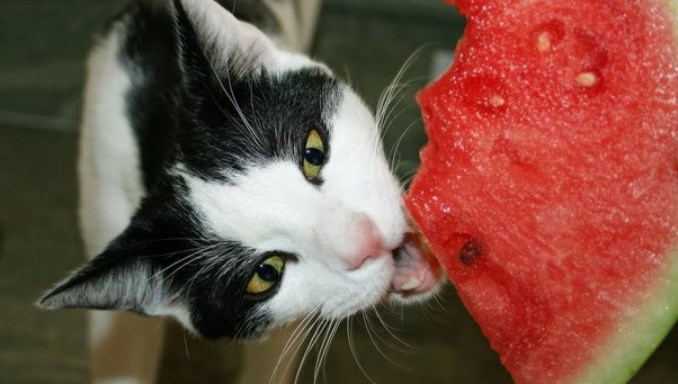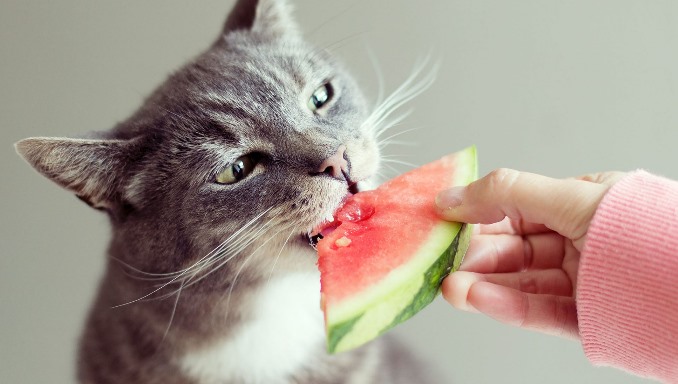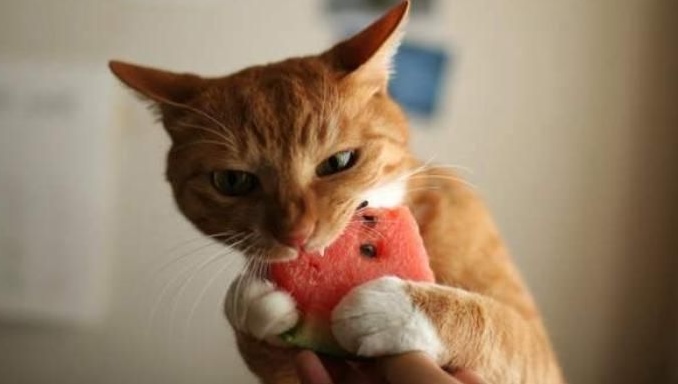Can Cats Eat Watermelon?
Watermelon is a healthy and refreshing summer snack, but can cats eat watermelon? The answer is yes, cats can eat watermelon, but there are a few things you need to know before feeding it to your pet. In this article, we’ll discuss the nutritional benefits of watermelon for cats, as well as the potential risks associated with feeding this fruit to felines. Let’s take a closer look at how watermelon can benefit your cat’s diet!
Watermelon is a popular summer fruit. It is usually eaten fresh, but can also be used in a number of recipes. Watermelon is a good source of vitamins and minerals, including vitamin C, potassium, and magnesium. It is also low in calories and fat. Watermelon is a refreshing summer fruit that can be enjoyed in a variety of ways. It can be eaten fresh, in a salad, or in a recipe.
There is no doubt that watermelon is a delicious and nutritious fruit for humans, but is it suitable for cats to eat? That is the concern of many cat owners, because there are some fruits that are nutritious to humans but harmful to cats. This is explained because the digestive systems of cats and humans are different, in the following section we will answer the question can cats eat watermelon, let’s find out with VetRanch!
See more: Can Cats Eat Cucumbers? The Benefits of Cucumbers for Cats
Nutritional Composition of Watermelon
Watermelon is a refreshing and healthy fruit that is loved by many. It is not only delicious but also packed with nutrients that are essential for our health. Here is a look at the nutritional composition of watermelon:
Water: Watermelons are mostly made up of water, about 92% to be exact. This makes them a great fruit to eat if you are looking to stay hydrated.
Vitamins: Watermelons are a good source of vitamins A, C, and B6. Vitamin A is important for vision and the immune system, while vitamin C is a powerful antioxidant that can help protect against some diseases. Vitamin B6 is essential for metabolism and energy production.
Minerals: Watermelons are also a good source of minerals such as potassium and magnesium. Potassium is important for heart health and blood pressure control, while magnesium is essential for bone health.
Antioxidants: Watermelons contain several powerful antioxidants, including lycopene and beta-carotene. These substances can help protect against some diseases, including cancer.
Watermelon is a nutritious and healthy fruit that can be enjoyed by everyone. It is a good source of vitamins, minerals, and antioxidants that are essential for our health. So, next time you are looking for a refreshing and healthy snack, reach for a watermelon!
Can Cats Eat Watermelon?
Yes, cats can eat watermelon. Watermelons are not toxic to cats, and in fact, they may be beneficial for your cat’s health. Watermelons are a good source of hydration, and they also contain vitamins A and C, which are important for your cat’s overall health. If you give your cat watermelon, be sure to remove the seeds first. Seeds can be a choking hazard for cats.
Cats can eat watermelon, but there are a few things to keep in mind. Watermelon is high in sugar and water content, so it should be fed in moderation. Feeding your cat too much watermelon could lead to digestive issues.
Do Cats Enjoy Watermelon?
Cats enjoy watermelon just like any other type of fruit. Watermelon is a good source of hydration for cats, as well as a tasty treat. It’s important to remove the seeds from the watermelon before giving it to your cat, as they can be a choking hazard. Cats typically like the fleshy part of the watermelon the best, but they may also enjoy chewing on the rind. If you’re looking for a healthy snack to give your cat, watermelon is a great option.
Can Cats Smell Watermelon?
Yes, cats can smell watermelon. Watermelon has a strong, sweet scent that is easily detectable by cats. In fact, many cats enjoy the smell of watermelon and will often try to eat the fruit itself. However, it is important to note that watermelon does contain sugar, so it should be given in moderation as part of a healthy diet for cats.
Benefits & Risks of Feeding Cats Watermelon
Watermelon is a healthy and refreshing snack for humans, and many people wonder if it’s safe to share with their feline friends. While watermelon is not toxic to cats, there are potential risks associated with feeding it to them.
The biggest risk of feeding watermelon to your cat is the potential for choking. Watermelon contains large seeds that could cause your cat to choke if they try to eat them. Additionally, watermelon is a very juicy fruit, and the juice can potentially cause diarrhea in cats. If you do feed watermelon to your cat, be sure to remove the seeds and cut the fruit into small pieces to avoid any choking hazards.
While there are some risks associated with feeding watermelon to cats, there are also some potential benefits. Watermelon is a good source of vitamins A and C, as well as antioxidants and lycopene. These nutrients can help boost your cat’s immune system and support their overall health. Additionally, the water content in watermelon can help keep your cat hydrated, especially on hot days.
If you decide to feed watermelon to your cat, be sure to do so in moderation. Like with any new food, introduce it slowly and in small amounts to avoid gastrointestinal upset. And, as always, consult with your veterinarian before making any changes to your cat’s diet.
How to Feed Watermelon to Your Cat
There are a few things to consider when making watermelon dishes for your cat. The first is to make sure that the watermelon is ripe and fresh. You will also want to remove the rind and seeds from the watermelon before cutting it into small pieces for your cat.
One simple way to give your cat watermelon is to cut it into small chunks and offer it to them on a plate. You can also add a little bit of water to the watermelon pieces to help your cat stay hydrated.
Another option is to puree the watermelon and then mix it with some wet food or kibble. You can also freeze the pureed watermelon into small cubes and then offer them to your cat as a frozen treat.
If you want to get really creative, you can try making watermelon sushi rolls! To do this, puree the watermelon and then spread it onto a piece of nori seaweed. Roll it up and then cut it into small pieces. Your cat will love this healthy and refreshing treat!
When Watermelons Are Ripe For Cat?
It’s summertime, and that means it’s time to enjoy one of the season’s most refreshing fruits: watermelons! While watermelons are available year-round in many parts of the world, they’re at their peak during the hot summer months.
There are plenty of ways to enjoy watermelon, from simple slices to creative salads and even drinks. And if you’re looking for a tasty way to stay hydrated during the dog days of summer, watermelon is a great choice.
Here are some tips on how to select and store watermelons, as well as some ideas for enjoying this refreshing fruit.
When it comes to selecting a watermelon, there are a few things to keep in mind. First, look for a watermelon that is heavy for its size. This is an indication that it is juicy and ripe.
Next, check the watermelon for any bruises or blemishes. These can indicate that the fruit is not as fresh as it could be. Finally, take a sniff of the watermelon. It should have a sweet, fruity aroma.
Once you’ve selected a ripe watermelon, it’s time to enjoy it! Watermelon can be eaten on its own or used in a variety of recipes. You can make them or feed them directly, we’re sure cats will love it!
Is Watermelon OK for Kittens?
Yes, watermelon is generally safe for kittens to eat. However, there are a few things to keep in mind. Watermelon contains large seeds that could cause your kitten to choke if they try to eat them. Additionally, watermelon is a very juicy fruit, and the juice can potentially cause diarrhea in kittens. If you do feed watermelon to your kitten, be sure to remove the seeds and offer it in small amounts. And, as always, consult with your veterinarian before making any changes to your kitten’s diet.
FAQs
What happens when a cat eats watermelon?
A cat eating watermelon is a hilarious sight! What happens next is that the cat will most likely start to make funny faces, because the watermelon is so sour. The cat may also start to meow a lot, because it is not used to the taste of watermelon. If you give your cat a lot of watermelon, it may start to throw up. So, it is best to give your cat a small amount of watermelon at a time.
Which Fruits Can cats eat?
Cats can eat a variety of fruits, including watermelon, strawberries, blueberries, and bananas. However, it is best to introduce new foods to your cat slowly and in small amounts to avoid gastrointestinal upset. And, as always, consult with your veterinarian before making any changes to your cat’s diet.
What fruits are toxic to cats?
There are a number of fruits that are toxic to cats including: grapes, raisins, currants, sultanas and zante currants. Cats can also be poisoned by eating the pits, stems or leaves of apricots, cherries, peaches and plums. Symptoms of fruit toxicity in cats can include vomiting, diarrhea, abdominal pain, lethargy, weakness and collapse. If you think your cat has eaten any of these fruits, it is important to seek veterinary treatment immediately.
What fruits do cats love?
There are a variety of fruits that cats enjoy, including watermelons, strawberries, and grapes. While some people believe that citrus fruits are harmful to cats, there is no scientific evidence to support this claim. In fact, many veterinarians recommend feeding small amounts of citrus fruit to cats as a way to improve their overall health.
Can cats eat seedless watermelon?
Yes, cats can eat seedless watermelon. In fact, many cats enjoy watermelon as a treat. However, it’s important to keep in mind that watermelon is mostly water and thus doesn’t contain a lot of nutrients that are essential for your cat’s health. Therefore, it should only be given to your cat in moderation.
Can cats eat ice cream?
No, cats cannot eat ice cream. Ice cream is made with milk and milk products, which can give cats diarrhea. In addition, ice cream is often high in sugar, which can lead to weight gain and other health problems in cats. If you want to give your cat a special treat, try giving them a small amount of plain yogurt or ice water instead.
Can cats eat pumpkin?
Cats can eat pumpkin, but it is not a necessary part of their diet. Pumpkin can be a good source of fiber for cats and may help with digestive issues. However, too much pumpkin can cause diarrhea in cats. If you are going to feed your cat pumpkin, make sure it is pureed and only in small amounts.
Can my cat lick watermelon?
Yes, your cat can lick watermelon. Watermelons are safe for cats to eat. In fact, they may be beneficial for your cat’s health. Watermelons are a good source of hydration and contain vitamins A, B6, and C. They also contain antioxidants and amino acids. Plus, licking watermelon is a fun activity for your cat!
Conclusion
While it is generally safe for cats to eat watermelon, there are a few things to keep in mind. For example, make sure that your cat only eats ripe watermelons, as the seeds and rind can be dangerous for them. You should also remove any fruit residue from their whiskers and mouth after they’ve finished eating to avoid any skin irritation.
While watermelon is not toxic to cats, it may not be the best food choice for them. Consult with a veterinarian if you are unsure whether or not a specific food is safe for your cat. In general, it is best to feed cats commercial pet food rather than human food. Have you ever given your cat watermelon? If so, what did they think of it?
Above is the article “Can cats eat watermelon?”, Thanks for reading!
Further reading:











